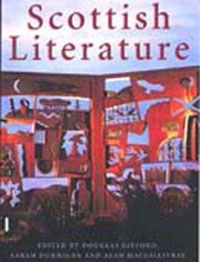 戰(zhàn)后的蘇格蘭文學 [ 2007-10-24 15:38 ]
戰(zhàn)后的新作家表現(xiàn)出一種新的外向性。50年代的Alexander Trocchi和60年代的Kenneth White都離開蘇格蘭,到法國去生活和工作。Edwin Morgan則以譯著不同歐洲語言的作品而著稱。Edwin Morgan是現(xiàn)任的蘇格蘭桂冠詩人(由英國王室任命的國家詩人),也譯著許多世界文學。他的詩歌涉及許多有爭議性的話題,從政治議題到學術討論都有所覆蓋。

New writers of the postwar years displayed a new outwardness. Both Alexander Trocchi in the 1950s and Kenneth White in the 1960s left Scotland to live and work in France. Edwin Morgan became known for translations of works from a wide range of European languages. Edwin Morgan is the current Scots Makar (the officially-appointed national poet, equivalent to a Scottish poet laureate) and also produces translations of world literature. His poetry covers the controversial, ranging over political issues, and academic debates.
The tradition of fantastical fiction is continued by Alasdair Gray, whose Lanark has become a cult classic since its publication in 1981. The 1980s also brought attention to writers capturing the urban experience and speech patterns - notably James Kelman and Jeff Torrington.
The works of Irvine Welsh, most famously Trainspotting, are written in a distinctly Scottish English, and reflect the underbelly of contemporary Scottish culture. Iain Banks and Ian Rankin have also achieved international recognition for their work, and, like Welsh, have had their work adapted for film or television. Alexander McCall Smith and Alan Warner have made significant contributions in the 21st century.
Scottish Gaelic literature is currently experiencing a revival, with the publishing of An Leabhar Mòr and the ùr Sgeul series, which encouraged new authors of poetry and fiction.
The Scottish literature canon has in recent years opened up to the idea of including women authors, encouraging a revisiting of Scottish women's work from past and present. In recent years the publishing house Canongate has become increasingly successful, publishing Scottish literature from all eras, and encouraging new literature.
(British Council)
|